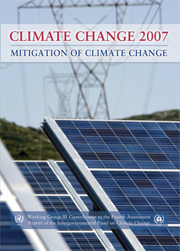 Climate Change 2007 - Mitigation of Climate Change
Climate Change 2007 - Mitigation of Climate Change EXECUTIVE SUMMARY
This chapter synthesizes information from the relevant literature on policies, instruments and co-operative arrangements, focusing mainly on new information that has emerged since the Third Assessment Report (TAR). It reviews national policies, international agreements and initiatives of sub-national governments, corporations and non-governmental organizations (NGOs).
National policies
The literature on climate change continues to reflect the wide variety of national policies and measures that are available to governments to limit or reduce greenhouse gas (GHG) emissions. These include regulations and standards, taxes and charges, tradable permits, voluntary agreements, subsidies, financial incentives, research and development programmes and information instruments. Other policies, such as those affecting trade, foreign direct investment, consumption and social development goals, can also affect GHG emissions. Climate change policies, if integrated with other government polices, can contribute to sustainable development in developed and developing countries alike.
Reducing emissions across all sectors and gases requires a portfolio of policies tailored to fit specific national circumstances. While the advantages and disadvantages of any one given instrument can be found in the literature, four main criteria are widely used by policymakers to select and evaluate policies: environmental effectiveness, cost-effectiveness, distributional effects (including equity) and institutional feasibility. Other more specific criteria, such as effects on competitiveness and administrative feasibility, are generally subsumed within these four.
The literature provides a great deal of information for assessing how well different instruments meet these criteria, although it should be kept in mind that all instruments can be designed well or poorly and to be stringent or lax and politically attractive or unattractive. In addition, all instruments must be monitored and enforced to be effective.
To save this book to your Kindle, first ensure no-reply@cambridge.org is added to your Approved Personal Document E-mail List under your Personal Document Settings on the Manage Your Content and Devices page of your Amazon account. Then enter the ‘name’ part of your Kindle email address below. Find out more about saving to your Kindle.
Note you can select to save to either the @free.kindle.com or @kindle.com variations. ‘@free.kindle.com’ emails are free but can only be saved to your device when it is connected to wi-fi. ‘@kindle.com’ emails can be delivered even when you are not connected to wi-fi, but note that service fees apply.
Find out more about the Kindle Personal Document Service.
To save content items to your account, please confirm that you agree to abide by our usage policies. If this is the first time you use this feature, you will be asked to authorise Cambridge Core to connect with your account. Find out more about saving content to Dropbox.
To save content items to your account, please confirm that you agree to abide by our usage policies. If this is the first time you use this feature, you will be asked to authorise Cambridge Core to connect with your account. Find out more about saving content to Google Drive.